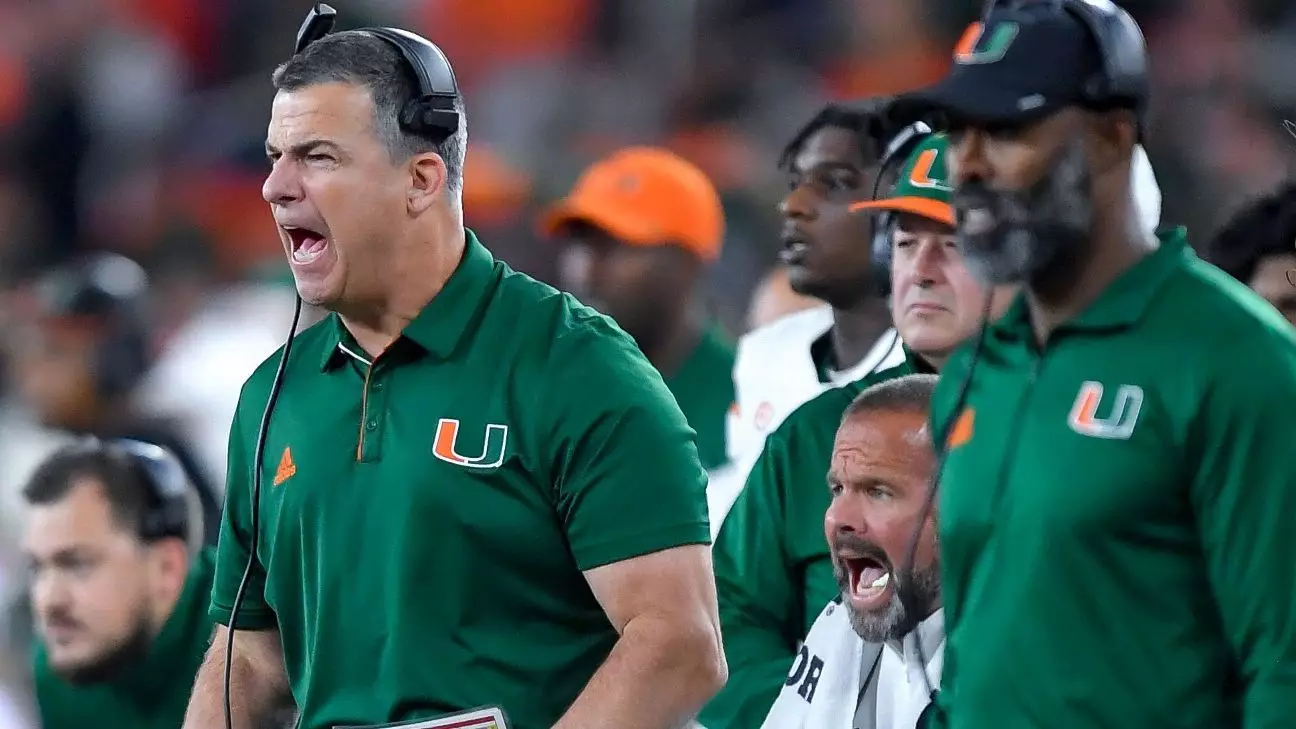The announcement of the latest College Football Playoff (CFP) rankings has stirred significant controversy, particularly regarding the status of the Miami Hurricanes. In the most recent release, Miami found itself unexpectedly dropped to the No. 12 position, following a tumultuous season marked by fluctuating performances and unfortunate losses. In contrast, Alabama managed to secure the No. 11 spot—a development that has raised eyebrows, especially considering Miami’s respectable overall record of 10-2.
The results of the rankings have not only created a ripple effect for Miami but also for the Atlantic Coast Conference (ACC) itself, which expressed its discontent with the selection committee’s decision. The ACC Commissioner, Jim Phillips, articulated the league’s disappointment, emphasizing that Miami “absolutely deserves better from the committee.” This reflects a broader sentiment within the conference regarding fairness in the ranking process, particularly in light of Miami’s successful start to the season.
One of the key factors contributing to Miami’s decline in the rankings has been the team’s recent struggles. After starting the season with a perfect 9-0 record, the Hurricanes faced a harsh reality check with back-to-back defeats, including a narrow 42-38 loss to Syracuse. These setbacks, particularly in conference games, have greatly diminished Miami’s standing, preventing them from competing in the ACC title game—a crucial opportunity for any team seeking to bolster its playoff resume.
Coach Mario Cristobal has been candid about his team’s performance and the rationale behind their CFP candidacy. He argued that Miami’s losses were close calls, coming down to mere possession games. This narrative aims to frame Miami’s season in a more positive light, suggesting that their overall competitiveness should be duly recognized by the selection committee. However, the critical view of their late-season performance cannot be ignored, as it raises questions about the resilience and consistency needed to compete at the highest level.
Despite the setbacks, Miami presents a compelling case for inclusion in the playoff conversation. They opened the season decisively with a convincing victory against Florida and have led the national statistics in both offensive yards and points per game. Quarterback Cam Ward’s impressive tally of 36 touchdown passes further bolsters their argument, positioning Miami as one of the most potent offensive teams in college football.
Moreover, Miami historically achieved an unblemished record at home, which indicates a strong fan base and home-field advantage. The losses they incurred were not entirely lopsided, showcasing the team’s potential to win crucial games despite their slip-ups. Coach Cristobal opined that the selection committee should prioritize teams that demonstrate winning records over those utilizing strategic lobbying for playoff spots.
However, several challenges cloud Miami’s playoff aspirations. Critics have pointed out that the team’s schedule lacked the strength of opposing teams—the Hurricanes did not face any ranked opponents during the weeks leading up to the rankings release. Additionally, defensive inconsistencies, highlighted by allowing at least 31 points in five out of their last eight games, have raised concerns about their capability to compete against higher-caliber opponents.
Although Miami ends the season among those ranked in the top 25 for both offensive and defensive metrics, these flaws have served as weaknesses that the selection committee may view as disqualifying factors. The urgent need for consistent performances, especially on the defensive end, has become obvious to not only the coaching staff but also the broader football community.
As the final rankings take shape, the Miami Hurricanes find themselves at a crossroads, grappling with the aftermath of disappointing losses while trying to advocate for a place in the College Football Playoff. The internal challenges of maintaining a competitive edge alongside external perceptions and critiques present a complex situation for the team and its coaches. With the ACC hoping for a reconsideration of Miami’s status, the looming question remains: can the Hurricanes overcome these adversities to secure their place in the college football postseason, or will they face yet another season on the sidelines? The answers to these questions will shape not just Miami’s future but also the evolving narrative of college football as a whole.


Leave a Reply